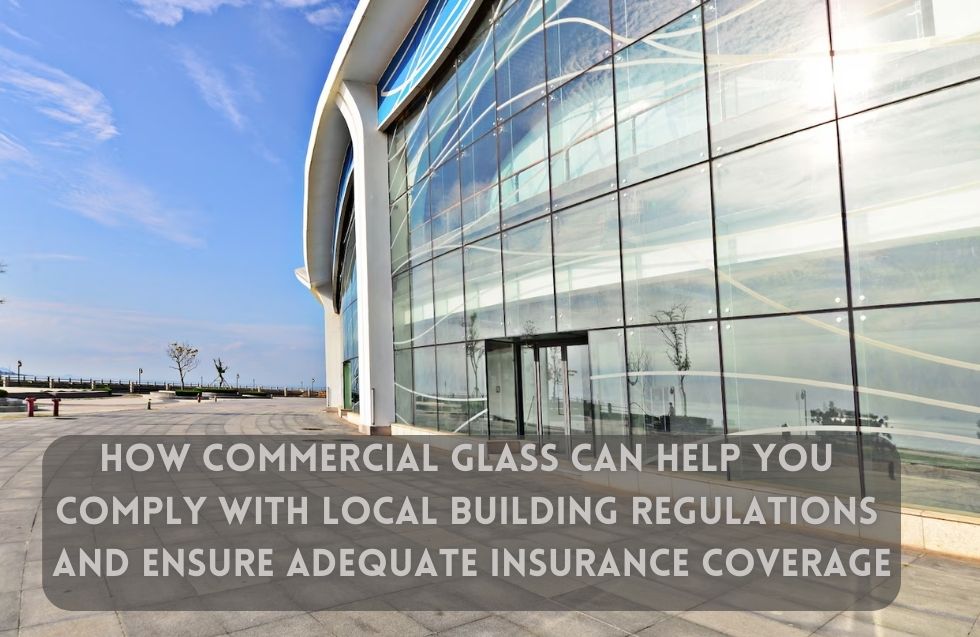Navigating local building regulations in commercial construction can be a complex task, but the right materials can significantly ease this burden. Commercial glass is not only a popular choice for enhancing aesthetics and energy efficiency, but it also plays a vital role in ensuring compliance with various building codes. Additionally, understanding the insurance landscape related to commercial glass can further protect your investment. In this blog, we’ll explore how commercial glass can help you meet local regulations and the types of insurance coverage to consider.
Understanding Local Building Regulations
Local building regulations vary by region and cover various requirements, including structural integrity, fire safety, energy efficiency, and accessibility. Compliance is crucial for the safety and well-being of occupants, and failure to meet these codes can lead to fines, project delays, and legal issues. Here’s how commercial glass can assist in meeting these regulatory requirements:
1. Energy Efficiency Compliance
Many local building codes mandate specific energy performance standards for commercial buildings. Energy-efficient glass, such as Low-E (low emissivity) glass, reflects heat while allowing natural light to enter, helping to regulate indoor temperatures and reduce energy consumption.
- Benefits: Utilizing energy-efficient glass can lead to significant savings on heating and cooling costs and contribute to a greener footprint.
2. Fire Safety Regulations
Fire safety is a critical component of local building regulations. Commercial glass can be an integral part of fire-rated assemblies, such as windows and partitions. Fire-rated glass is designed to withstand high temperatures and prevent the spread of flames and smoke, which is essential for compliance.
- Benefits: Fire-rated glass enhances safety and ensures that your building meets local fire safety regulations, providing critical time for evacuation in case of emergencies.
3. Accessibility Standards
Local codes often require compliance with the Americans with Disabilities Act (ADA) standards, which mandate equal access for individuals with disabilities. Commercial glass solutions, such as glass doors and walls, can enhance visibility and openness in spaces, making them more navigable.
- Benefits: Incorporating glass elements not only enhances aesthetics but also facilitates easier access for all individuals, ensuring compliance with accessibility standards.
4. Structural Integrity
Building codes require that materials used in construction meet specific structural integrity standards. High-quality commercial glass products are tested for strength and durability, ensuring that your building can withstand environmental stresses while remaining compliant.
- Benefits: Using durable glass reduces maintenance costs and ensures longevity, protecting your investment.
5. Sustainability and Environmental Impact
Sustainability is a growing focus in building regulations. Many jurisdictions encourage or require the use of sustainable materials. Commercial glass can contribute to a building’s sustainability by maximizing natural light and utilizing eco-friendly glass products.
- Benefits: Choosing sustainable glass options can enhance your building’s marketability and support local and global environmental initiatives.
Navigating Insurance for Commercial Glass
In addition to compliance, securing the right insurance coverage is essential for protecting your investment in commercial glass. Here are the key types of insurance to consider:
1. General Liability Insurance
This is a fundamental type of insurance for any business, including those involved in commercial construction. General liability insurance covers bodily injury, property damage, and personal injury claims that may arise from the use of glass in a building project. For example, if a glass installation leads to an injury on the premises, this insurance would help cover the associated legal costs and settlements.
2. Property Insurance
Property insurance protects the physical assets of a business, including the building itself and its contents. If glass in the building is damaged due to an accident, natural disaster, or vandalism, property insurance can help cover repair or replacement costs. This is especially important for businesses that rely on expensive glass installations, such as storefronts or large windows.
3. Builder’s Risk Insurance
If you’re in the construction phase, a builder’s risk insurance is crucial. This insurance covers buildings under construction, including materials, fixtures, and equipment. It typically protects against risks such as fire, theft, and vandalism. If glass panels or windows are damaged during construction, builder’s risk insurance would help cover the costs.
4. Professional Liability Insurance
For architects, engineers, or contractors involved in the design and installation of glass, professional liability insurance (also known as errors and omissions insurance) is essential. This type of insurance covers claims related to professional mistakes or negligence that could result in financial losses for clients. If a glass installation fails to meet local building regulations and leads to damages, this insurance can help cover legal costs.
5. Workers’ Compensation Insurance
If you have employees working on a construction site, workers’ compensation insurance is often legally required. This insurance covers medical expenses and lost wages for employees who are injured on the job, including accidents involving glass installation.
6. Product Liability Insurance
For companies that manufacture or supply commercial glass, product liability insurance is crucial. This insurance protects against claims of injury or property damage caused by defects in the glass products sold. If a glass panel shatters and injures someone, this insurance can help cover legal claims and settlements.
7. Glass Coverage Insurance
Some insurers offer specialized glass insurance that specifically covers the glass components of a building. This type of policy can provide additional coverage for breakage, theft, or damage due to specific events (like severe weather) that standard property insurance might not fully cover.
Conclusion
Incorporating commercial glass into your building projects is a strategic decision that can help you comply with local building regulations while enhancing the safety, functionality, and sustainability of your space. By understanding how commercial glass contributes to energy efficiency, fire safety, accessibility, and structural integrity, you can make informed choices that align with regulatory requirements.
Additionally, securing adequate insurance coverage tailored to your specific needs can protect your investment and ensure compliance throughout the project lifecycle. Working with experienced professionals in both commercial glass installation and insurance can help you navigate these complexities, ensuring a successful outcome for your business.












